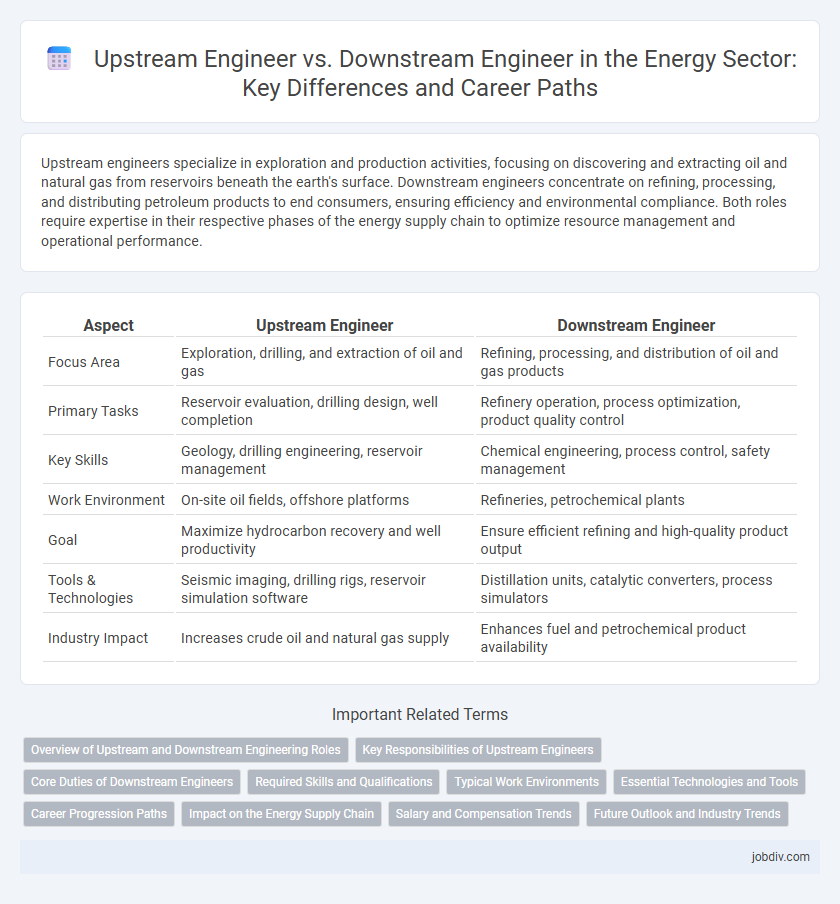Upstream engineers specialize in exploration and production activities, focusing on discovering and extracting oil and natural gas from reservoirs beneath the earth's surface. Downstream engineers concentrate on refining, processing, and distributing petroleum products to end consumers, ensuring efficiency and environmental compliance. Both roles require expertise in their respective phases of the energy supply chain to optimize resource management and operational performance.
Table of Comparison
| Aspect | Upstream Engineer | Downstream Engineer |
|---|---|---|
| Focus Area | Exploration, drilling, and extraction of oil and gas | Refining, processing, and distribution of oil and gas products |
| Primary Tasks | Reservoir evaluation, drilling design, well completion | Refinery operation, process optimization, product quality control |
| Key Skills | Geology, drilling engineering, reservoir management | Chemical engineering, process control, safety management |
| Work Environment | On-site oil fields, offshore platforms | Refineries, petrochemical plants |
| Goal | Maximize hydrocarbon recovery and well productivity | Ensure efficient refining and high-quality product output |
| Tools & Technologies | Seismic imaging, drilling rigs, reservoir simulation software | Distillation units, catalytic converters, process simulators |
| Industry Impact | Increases crude oil and natural gas supply | Enhances fuel and petrochemical product availability |
Overview of Upstream and Downstream Engineering Roles
Upstream engineers specialize in exploration and production activities, including drilling, reservoir management, and extraction of oil and gas resources. Downstream engineers focus on refining, processing, distribution, and marketing of petroleum products to transform crude oil into usable fuels and chemicals. Both roles require expertise in different stages of the energy value chain, with upstream centered on resource discovery and production, and downstream on refinement and delivery.
Key Responsibilities of Upstream Engineers
Upstream Engineers focus on exploration, drilling, and production of oil and gas resources, applying reservoir modeling and well design techniques to optimize extraction efficiency. They analyze geological data, assess reservoir performance, and collaborate with geoscientists to identify viable drilling locations and enhance hydrocarbon recovery. Their key responsibilities include well planning, evaluating reservoir characteristics, and implementing advanced completion technologies to maximize output while ensuring safety and environmental compliance.
Core Duties of Downstream Engineers
Downstream engineers focus on refining processes, petrochemical production, and distribution of oil and gas products such as gasoline, diesel, and jet fuel. Their core duties include designing and optimizing refining units, ensuring compliance with environmental and safety regulations, and managing product quality and efficiency. They collaborate with operations teams to troubleshoot production issues and implement technological upgrades to maximize refining output.
Required Skills and Qualifications
Upstream Engineers require expertise in geology, petrophysics, reservoir engineering, and seismic interpretation, alongside strong skills in drilling operations and hydraulic fracturing techniques. Downstream Engineers specialize in chemical engineering, process optimization, catalysis, and refinery operations, with proficiency in fluid dynamics, heat transfer, and environmental compliance. Both roles demand proficiency in software tools such as MATLAB, Aspen HYSYS, and data analysis platforms, combined with strong problem-solving abilities and a background in petroleum or chemical engineering.
Typical Work Environments
Upstream engineers typically operate on offshore platforms, drilling rigs, or remote exploration sites, focusing on oil and gas extraction processes. Downstream engineers work primarily in refineries, petrochemical plants, and distribution centers, managing the processing and conversion of raw hydrocarbons into finished products. Both roles demand adherence to strict safety and environmental regulations but differ significantly in their operational settings and technical challenges.
Essential Technologies and Tools
Upstream engineers utilize seismic imaging, reservoir simulation software, and drilling automation tools to optimize hydrocarbon exploration and extraction processes. Downstream engineers rely on process control systems, fluid catalytic cracking units, and refinery management software to enhance the efficiency of petroleum refining and distribution. Both roles integrate advanced data analytics and digital twin technologies to improve operational safety and resource management in the energy sector.
Career Progression Paths
Upstream engineers specialize in exploration and production, focusing on locating and extracting oil and gas reserves, often requiring expertise in geosciences and drilling technologies. Downstream engineers work on refining, processing, and distribution of petroleum products, emphasizing chemical engineering and process optimization skills. Career progression in upstream roles typically advances from drilling engineer to reservoir engineer and project manager, while downstream paths lead from process engineer to plant manager and operations director.
Impact on the Energy Supply Chain
Upstream Engineers focus on exploration and production, optimizing oil and gas extraction processes that directly increase raw material availability in the energy supply chain. Downstream Engineers concentrate on refining, processing, and distribution, enhancing product quality and efficiency to meet market demand for fuels and petrochemicals. Both roles are critical, with Upstream ensuring resource supply and Downstream maximizing value through conversion and delivery.
Salary and Compensation Trends
Upstream engineers typically command higher salaries due to the technical challenges and risks associated with exploration and production activities in the oil and gas sector. Downstream engineers, while often receiving competitive compensation, tend to have more stable salary growth linked to refining, distribution, and petrochemical processing operations. Salary trends for both roles show regional variation, with upstream positions offering premium pay in areas rich in natural resources, whereas downstream roles benefit from consistent wage increment patterns in industrial hubs.
Future Outlook and Industry Trends
Upstream engineers focus on exploration and production of oil and gas, with future demand driven by advancements in reservoir simulation, digitalization, and enhanced oil recovery technologies. Downstream engineers, specializing in refining and distribution, face industry trends emphasizing biofuels, carbon capture, and process optimization to meet stricter environmental regulations. Both roles will increasingly incorporate AI, automation, and sustainability practices as the energy sector transitions toward cleaner and more efficient operations.
Upstream Engineer vs Downstream Engineer Infographic

 jobdiv.com
jobdiv.com